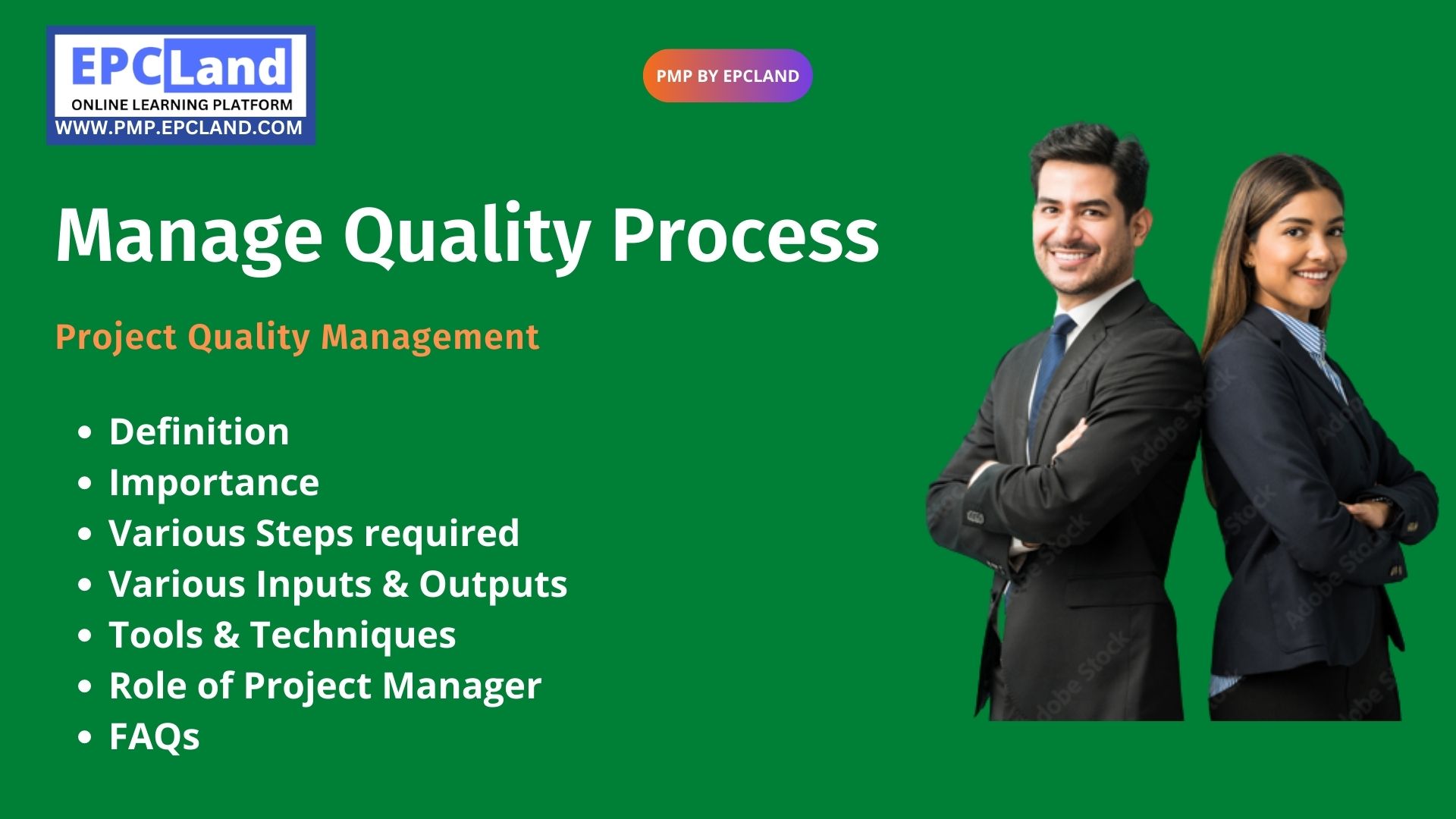Project quality management is a critical aspect of ensuring the success of any project. A well-designed and effectively managed quality process can help ensure that the project is completed on time, within budget, and to the required level of quality. The goal of managing quality processes in project management is to ensure that the project meets the needs and expectations of all stakeholders. This includes ensuring that the project is delivered on time, within budget, and meets all quality requirements. To achieve this, project managers must implement best practices for managing quality processes, such as defining quality criteria, establishing quality control procedures, and conducting regular quality audits. By mastering the art of managing quality processes, project managers can ensure the success of their projects and achieve outstanding results.
What is the Importance of “Manage Quality Process” in Project Quality Management
The importance of managing quality processes in project quality management can be summarized as follows:
- Improved project outcomes: Effective management of quality processes leads to better project outcomes, including on-time delivery, within budget, and to the required level of quality.
- Increased customer satisfaction: By managing quality processes, project managers can ensure that the project meets the needs and expectations of customers and other stakeholders, leading to increased customer satisfaction.
- Reduced risk: Proper management of quality processes helps identify and mitigate potential risks in the project, reducing the likelihood of project failures.
- Increased efficiency: A well-designed and managed quality process streamlines the project and increases overall efficiency.
- Improved project reputation: Consistently delivering high-quality projects enhances the reputation of the project team and the organization.
Attempt Quiz-1 on Manage Quality Process
What are Various Steps required in “Manage Quality Process” in Project Quality Management
The various steps involved in managing quality processes in project quality management are:
- Define quality criteria: Establish clear, measurable quality standards and criteria that the project must meet.
- Develop quality control plan: Create a plan for monitoring and controlling the quality of the project to ensure that the quality criteria are met.
- Implement quality control procedures: Put in place procedures for inspecting and testing project deliverables to ensure they meet the established quality criteria.
- Conduct regular quality audits: Regularly review the project to assess the quality of the deliverables and ensure the quality control plan is being followed.
- Continuously monitor and improve quality: Continuously monitor the quality of the project and identify areas for improvement to ensure that the project remains on track.
- Report and communicate quality results: Communicate quality results to stakeholders, including project team members, customers, and management.
- Integrate quality management into project processes: Integrate quality management into all project processes, including planning, execution, monitoring and controlling, and closing.
What are various Tools & Techniques used for “Manage Quality Process” in Project Quality Management
The following are some common tools and techniques used for managing quality processes in project quality management:
- Quality control charts: Graphical tools used to monitor and control project quality.
- Statistical process control: Analytical method used to control quality by tracking and analyzing data.
- Root cause analysis: A technique used to identify the underlying causes of quality problems and implement corrective actions.
- Inspection: An examination of project deliverables to determine if they meet quality criteria.
- Pareto chart: A graphical tool used to prioritize quality improvement activities based on the most significant causes of quality problems.
- Flow chart: A diagram that shows the flow of activities in a process.
- Control plan: A plan for controlling the quality of a product or process.
- Process mapping: A technique used to graphically represent the steps involved in a process.
- Checklists: Lists of items to be checked or verified to ensure that the project is meeting quality criteria.
What are various Inputs required for “Manage Quality Process” in Project Quality Management
The inputs required for managing quality processes in project quality management are:
- Project charter: The document that outlines the purpose, objectives, and stakeholders of the project.
- Project management plan: A comprehensive plan that outlines how the project will be managed, including the quality management plan.
- Quality criteria: The standards and requirements that the project must meet to be considered successful.
- Work breakdown structure (WBS): A detailed breakdown of the work involved in the project.
- Schedule: The timeline for completing the project.
- Budget: The financial plan for the project, including resources and costs.
- Risk register: A document that identifies and assesses potential risks to the project.
- Stakeholder requirements: The needs and expectations of the project stakeholders.
- Lessons learned from previous projects: Knowledge and information gained from previous projects that can be applied to improve quality processes in the current project.
What are various Outputs required for “Manage Quality Process” in Project Quality Management
The outputs of managing quality processes in project quality management include:
- Quality control measurements: Results of quality control inspections, tests, and audits.
- Quality management plan: A comprehensive plan that outlines the approach to quality management for the project.
- Quality metrics: Performance measurements used to evaluate the quality of the project.
- Quality reports: Reports on the quality of the project, including results of quality control activities and any identified quality issues.
- Change requests: Requests to change the project management plan or quality management plan, including any updates to quality criteria or quality control procedures.
- Corrective and preventive actions: Measures taken to address quality problems and prevent them from recurring.
- Quality deliverables: The final products or services produced by the project, meeting the established quality criteria.
What is Role of Project Manager in “Manage Quality Process” in Project Quality Management
The project manager plays a critical role in managing quality processes in project quality management. Some of the responsibilities of the project manager include:
- Developing and implementing the quality management plan: The project manager is responsible for defining the quality standards and criteria for the project and creating a plan for managing quality.
- Monitoring and controlling quality: The project manager is responsible for monitoring and controlling the quality of the project, including inspections, tests, and audits, and taking corrective actions when necessary.
- Communicating quality expectations to team members: The project manager is responsible for ensuring that team members understand the quality expectations for the project and their role in achieving those expectations.
- Ensuring the availability of resources: The project manager is responsible for ensuring that the necessary resources, such as personnel, materials, and equipment, are available to manage quality processes.
- Reporting on quality performance: The project manager is responsible for providing regular updates on the quality of the project, including results of quality control activities and any identified quality issues.
- Continuous improvement: The project manager is responsible for continuous improvement of quality processes, including implementing best practices and lessons learned from previous projects.
Attempt Quiz-2 on Manage Quality Process
FInal Take Away on “Manage Quality Process” in Project Quality Management
Managing quality processes is critical for the success of any project in project quality management. It involves defining quality standards, creating a quality management plan, monitoring and controlling quality, communicating expectations to team members, and continuous improvement. The project manager plays a crucial role in ensuring the successful implementation of quality processes, from developing the quality management plan to reporting on quality performance. By effectively managing quality processes, project managers can deliver high-quality project outputs that meet stakeholder expectations and ensure project success.
FAQs on “Manage Quality Process” in Project Quality Management
- What is the purpose of managing quality processes in project quality management? The purpose of managing quality processes is to ensure that the project produces outputs that meet the quality standards and expectations of stakeholders. This includes defining quality criteria, creating a quality management plan, monitoring and controlling quality, and continuously improving quality processes.
- What is the role of the project manager in managing quality processes? The project manager plays a critical role in managing quality processes. Some of the responsibilities of the project manager include developing and implementing the quality management plan, monitoring and controlling quality, communicating quality expectations to team members, ensuring the availability of resources, and reporting on quality performance.
- What are the inputs required for managing quality processes? The inputs required for managing quality processes include the project management plan, the quality management plan, project scope statement, requirements documentation, and performance reports.
- What are the outputs of managing quality processes? The outputs of managing quality processes include quality control measurements, quality management plan, quality metrics, quality reports, change requests, corrective and preventive actions, and quality deliverables.
- What tools and techniques are used for managing quality processes? The tools and techniques used for managing quality processes include quality control inspections, quality control tests, quality control audits, statistical sampling, flowcharting, cause-and-effect diagrams, and control charts.
- What is the importance of continuous improvement in managing quality processes? Continuous improvement is critical in managing quality processes, as it helps identify and address areas for improvement, implement best practices, and ensure that quality processes remain relevant and effective over time.


















